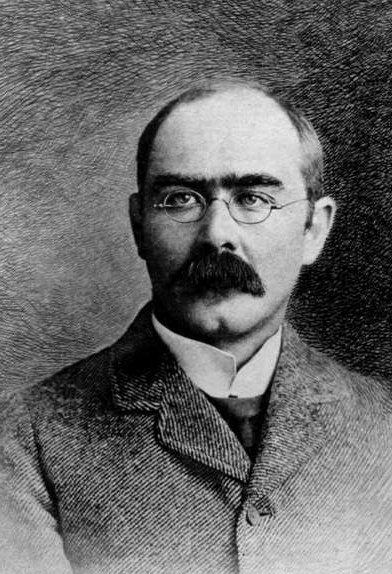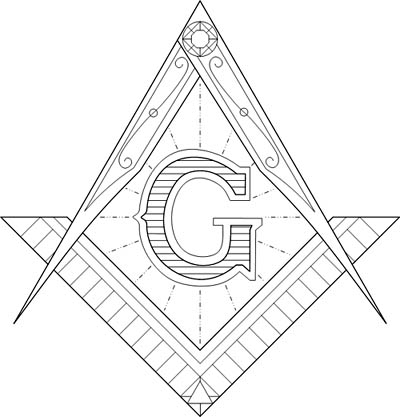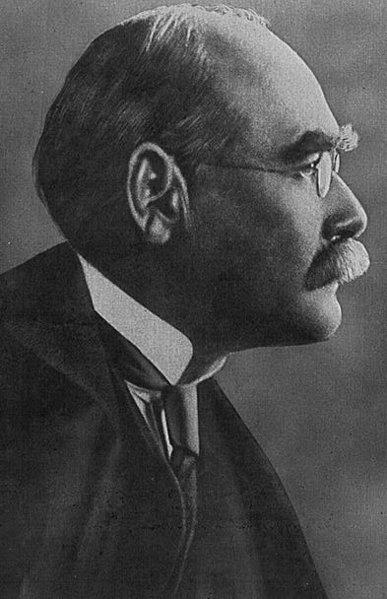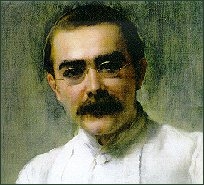Rudyard Kipling biographie maçonnique et avis du Frère Kipling sur le Mormonisme
Petite biographie de Rudyard Kipling

Le grand Rudyard Kipling (1865-1936)
Né à Bombay (Inde) le 30 décembre 1865, il a reçu son éducation en Angleterre. Il retourne en Inde en 1882. Poète, auteur, esprit curieux de tout, humaniste, il reçoit le Prix Nobel de littérature en 1907. Il a publié plus de 80 livres et ballades. Certains de ces ouvrages ont reçu un accueil mondial, comme le célèbre « Livre de la Jungle ». Son travail célèbre l'Empire Britannique. Mais également les rites initiatiques qui existent aux Indes, parmi le peuple indigène.
Franc-Maçon, l'influence de la Maçonnerie se fait ressentir au travers de plusieurs de ces romans, parmi eux, « l'homme qui voulu être roi » est l'un des plus significatifs. Et le poème « Si » reste l'un des plus utilisé dans la Franc-Maçonnerie mondiale, y compris en France.
Il fut initié le 5 Avril 1886 par dispense en raison de son jeune âge.
Il fut élevé compagnon le 3 mai 1886
Exalté à la Maîtrise le 6 Décembre 1886.
Soit un itinéraire fulgurant sur le plan maçonnique, du à sa grande maturité.
Il appartenait à la loge « Hope and Perseverance Lodge n° 782 E.C. » à l'Orient de Lahore, Inde. Il fut secrétaire de cette loge.
Le 8 Juillet 1909, il rejoint la Society Roscicruciana in Anglia. Où il connut les mystères de la Rose et de la Croix.
En France, en Janvier 1922, il sera membre fondateur de la loge « The builders of the Silent Cities Lodge n°12 » à l'Orient de Saint Omer. Il sera également membre honoraire des loges « Author's Lodge n° 3456 E .C. » et « Motherland Lodge n° 3861 E. C. »

Voici son poème le plus célèbre dans le monde Maçonnique, qui fut à l'origine écrit en 1910 pour son jeune fils John, âgé de 12 ans, et qui devait être mortellement atteint lors de la première guerre mondiale.
Si...
Si tu peux voir détruit l'ouvrage de ta vie
Et sans dire un seul mot te mettre à rebâtir,
Ou perdre en un seul coup le gain de cent parties
Sans un geste et sans un soupir ;
Si tu peux être amant sans être fou d'amour,
Si tu peux être fort sans cesser d'être tendre,
Et, te sentant haï, sans haïr à ton tour,
Pourtant lutter et te défendre;
Si tu peux supporter d'entendre tes paroles
Travesties par des gueux pour exciter des sots,
Et d'entendre mentir sur toi leurs bouches folles
Sans mentir toi-même d'un mot ;
Si tu peux rester digne en étant populaire,
Si tu peux rester peuple en conseillant les rois,
Et si tu peux aimer tous tes amis en frères,
Sans qu'aucun d'eux soit tout pour toi;
Si tu sais méditer, observer et connaître,
Sans jamais devenir sceptique ou destructeur ;
Rêver, mais sans laisser ton rêve être ton maître,
Penser sans n'être que penseur ;
Si tu sais être dur, sans jamais être en rage,
Si tu sais être brave et jamais imprudent,
Si tu sais être bon, si tu sais être sage,
Sans être moral et pédant;
Si tu peux rencontrer Triomphe après Défaite
Et recevoir ces deux menteurs d'un même front,
Si tu peux conserver ton courage et ta tête
Quand tous les autres les perdront,
Alors les Rois les Dieux la Chance et la Victoire
Seront à tout jamais tes esclaves soumis,
Et, ce qui vaut bien mieux que les Rois et la Gloire,
Tu seras un homme mon fils.
Rudyard Kipling
Voici un autre poème strictement maçonnique, la Loge Mère, encore lu dans de nombreuses loges à travers le monde au XXIe siècle :
Il y avait Rundle, le chef de station,
Beazeley, des voies et travaux,
Ackman, de l'intendance,
Dankin, de la prison,
Et Blake, le sergent instructeur,
Qui fut deux fois notre Vénérable,
Et aussi le vieux Franjee Eduljee
Qui tenait le magasin "Aux denrées Européennes".
Dehors, on se disait : "Sergent, Monsieur, Salut, Salam".
Dedans c'était : "Mon frère", et c'était très bien ainsi.
Nous nous réunissions sur le niveau et nous nous quittions sur l'équerre.
Moi, j'étais second diacre dans ma Loge-mère, là-bas !
Il y avait encore Bola Nath, le comptable,
Saül, le juif d'Aden,
Din Mohamed, du bureau du cadastre,
Le sieur Chucherbutty,
Amir Singh le Sikh,
Et Castro, des ateliers de réparation,
Le Catholique romain.
Nos décors n'étaient pas riches,
Notre Temple était vieux et dénudé,
Mais nous connaissions les anciens Landmarks
Et les observions scrupuleusement.
Quand je jette un regard en arrière,
Cette pensée, souvent me vient à l'esprit :
"Au fond il n y a pas d'incrédules
Si ce n'est peut-être nous-mêmes ! "
Car, tous les mois, après la tenue,
Nous nous réunissions pour fumer.
Nous n'osions pas faire de banquets
De peur d'enfreindre la règle de caste de certains frères.
Et nous causions à cœur ouvert de religion et d'autres choses,
Chacun de nous se rapportant
Au Dieu qu'il connaissait le mieux.
L'un après l'autre, les frères prenaient la parole
Et aucun ne s'agitait.
L'on se séparait à l'aurore, quand s'éveillaient les perroquets
Et le maudit oiseau porte-fièvre ;
Comme après tant de paroles
Nous nous en revenions à cheval,
Mahomet, Dieu et Shiva
Jouaient étrangement à cache-cache dans nos têtes.
Bien souvent depuis lors,
Mes pas errant au service du Gouvernement,
Ont porté le salut fraternel
De l'orient à l'Occident,
Comme cela nous est recommandé,
De Kohel à Singapour
Mais combien je voudrais les revoir tous
Ceux de la Loge-Mère, là-bas !
Comme je voudrais les revoir,
Mes frères noirs et bruns,
Et sentir le parfum des cigares indigènes
Pendant que circule l'allumeur,
Et que le vieux limonadier
Ronfle sur le plancher de l'office.
Et me retrouver parfait Maçon
Une fois encore dans ma Loge d'autrefois.
Dehors, on se disait : »Sergent, Monsieur, Salut, Salam ».
Dedans c'était : "Mon frère " et c'était très bien ainsi.
Nous nous réunissions sur le niveau et nous nous quittions sur l'équerre.
Moi, j'étais second diacre dans ma Loge-mère, là-bas !

Voici en Anglais, le poème Gunga Din qui inspira un film célèbre de 1939, du même nom :
Gunga Din
Poem lyrics of Gunga Din by Rudyard Kipling.
You may talk o' gin and beer
When you're quartered safe out 'ere,
An' you're sent to penny-fights an' Aldershot it;
But when it comes to slaughter
You will do your work on water,
An' you'll lick the bloomin' boots of 'im that's got it.
Now in Injia's sunny clime,
Where I used to spend my time
A-servin' of 'Er Majesty the Queen,
Of all them blackfaced crew
The finest man I knew
Was our regimental bhisti, Gunga Din.
He was "Din! Din! Din!
You limpin' lump o' brick-dust, Gunga Din!
Hi! slippery "hitherao"!
Water, get it! "Panee lao"! [Bring water swiftly.]
You squidgy-nosed old idol, Gunga Din."
The uniform 'e wore
Was nothin' much before,
An' rather less than 'arf o' that be'ind,
For a piece o' twisty rag
An' a goatskin water-bag
Was all the field-equipment 'e could find.
When the sweatin' troop-train lay
In a sidin' through the day,
Where the 'eat would make your bloomin' eyebrows crawl,
We shouted "Harry By!" [Mr. ]
Rudyard Kipling admirait le Mormonisme, il déclara dans l'un de ces textes « il y a des qualités très fines dans le mormonisme ». Et il relate l'œuvre des Mormons à Salt Lake City en termes élogieux. Sans doute admire-t-il en eux, des vertus qui lui rappellent celle des sujets de l'Empire Britannique, et son amour de l'ésotérisme et de l'initiatique fut sans doute touché par le côté mystérieux du Temple mormon.
Nous citons ici cette note américaine du Frère Kipling qui parle du Mormonisme :

Rudyard Kipling
The American Army
I SHOULD very much like to deliver a dissertation on the American army and the possibilities of its extension. You see, it is such a beautiful little army, and the dear people don't quite understand what to do with it. The theory is that it is an instructional nucleus round which the militia of the country will rally, and from which they will get a stiffening in time of danger. Yet other people consider that the army should be built, like a pair of lazy tongs—on the principle of elasticity and extension—so that in time of need it may fill up its skeleton battalions and empty saddle troops. This is real wisdom, because the American army, as at present constituted, is made up of:—Twenty-five regiments infantry, ten companies each.
Ten regiments cavalry, twelve companies each.
Five regiments artillery, twelve companies each.
Now there is a notion in the air to reorganize the service on these lines:—Eighteen regiments infantry at four battalions, four companies each; third battalion, skeleton; fourth on paper.
Eight regiments cavalry at four battalions, four troops each; third battalion, skeleton; fourth on paper.
Five regiments artillery at four battalions, four companies each; third battalion, skeleton; fourth on paper.
Observe the beauty of this business. The third battalion will have its officers, but no men; the fourth will probably have a rendezvous and some equipment.
It is not contemplated to give it anything more definite at present. Assuming the regiments to be made up to full complement, we get an army of fifty thousand men, which after the need passes away must be cut down fifty per cent, to the huge delight of the officers.
The military needs of the States be three: (a) Frontier warfare, an employment well within the grip of the present army of twenty-five thousand, and in the nature of things growing less arduous year by year; (b) internal riots and commotions which rise up like a dust devil, whirl furiously, and die out long before the authorities at Washington could begin to fill up even the third skeleton battalions, much less hunt about for material for the fourth; (c) civil war, in which, as the case in the affair of the North and South, the regular army would be swamped in the mass of militia and armed volunteers would turn the land into a hell.
Yet the authorities persist in regarding an external war as a thing to be seriously considered.
The Power that would disembark troops on American soil would be capable of heaving a shovelful of mud into the Atlantic in the hope of filling it up. Consequently, the authorities are fascinated with the idea of the sliding scale or concertina army. This is an hereditary instinct, for you know that when we English have got together two companies, one machine gun, a sick bullock, forty generals, and a mass of W. O. forms, we say we possess "an army corps capable of indefinite extension."
The American army is a beautiful little army. Some day, when all the Indians are happily dead or drunk, it ought to make the finest scientific and survey corps that the world has ever seen; it does excellent work now, but there is this defect in its nature: It is officered, as you know, from West Point.
The mischief of it is that West Point seems to be created for the purpose of spreading a general knowledge of military matters among the people. A boy goes up to that institution, gets his pass, and returns to civil life, so they tell me, with a dangerous knowledge that he is a suckling Von Moltke, and may apply his learning when occasion offers. Given trouble, that man will be a nuisance, because he is a hideously versatile American, to begin with, as cock-sure of himself as a man can be, and with all the racial disregard for human life to back him, through any demi-semi-professional generalship.
In a country where, as the records of the daily papers show, men engaged in a conflict with police or jails are all too ready to adopt a military formation and get heavily shot in a sort of cheap, half-constructed warfare, instead of being decently scared by the appearance of the military, this sort of arrangement does not seem wise.
The bond between the States is of an amazing tenuity. So long as they do not absolutely march into the District of Columbia, sit on the Washington statues, and invent a flag of their own, they can legislate, lynch, hunt negroes through swamps, divorce, railroad, and rampage as much as ever they choose. They do not need knowledge of their own military strength to back their genial lawlessness.
That regular army, which is a dear little army, should be kept to itself, blooded on detachment duty, turned into the paths of science, and now and again assembled at feasts of Free Masons, and so forth.
It is too tiny to be a political power. The immortal wreck of the Grand Army of the Republic is a political power of the largest and most unblushing description. It ought not to help to lay the foundations of an amateur military power that is blind and irresponsible.
By great good luck the evil-minded train, already delayed twelve hours by a burned bridge, brought me to the city on a Saturday by way of that valley which the Mormons, over their efforts, had caused to blossom like the rose. Twelve hours previously I had entered into a new world where, in conversation, every one was either a Mormon or a Gentile. It is not seemly for a free and independent citizen to dub himself a Gentile, but the Mayor of Ogden—which is the Gentile city of the valley—told me that there must be some distinction between the two flocks.
Long before the fruit orchards of Logan or the shining levels of the Salt Lake had been reached, that mayor—himself a Gentile, and one renowned for his dealings with the Mormons—told me that the great question of the existence of the power within the power was being gradually solved by the ballot and by education.
All the beauty of the valley could not make me forget it. And the valley is very fair. Bench after bench of land, flat as a table against the flanks of the ringing hills, marks where the Salt Lake rested for awhile in its collapse from an inland sea to a lake fifty miles long and thirty broad.
There are the makings of a very fine creed about Mormonism. To begin with, the Church is rather more absolute than that of Rome. Drop the polygamy plank in the platform, but on the other hand deal lightly with certain forms of excess; keep the quality of the recruit down to the low mental level, and see that the best of all the agricultural science available is in the hands of the elders, and there you have a first-class engine for pioneer work. The tawdry mysticism and the borrowing from Freemasonry serve the low caste Swede and Dane, the Welshman and the Cornish cotter, just as well as a highly organized heaven.
Then I went about the streets and peeped into people's front windows, and the decorations upon the tables were after the manner of the year 1850. Main Street was full of country folk from the desert, come in to trade with the Zion Mercantile Co-operative Institute. The Church, I fancy, looks after the finances of this thing, and it consequently pays good dividends.
The faces of the women were not lovely. Indeed, but for the certainty that ugly persons are just as irrational in the matter of undivided love as the beautiful, it seems that polygamy was a blessed institution for the women, and that only the dread threats of the spiritual power could drive the hulking, board-faced men into it. The women wore hideous garments, and the men appeared to be tied up with strings.
They would market all that afternoon, and on Sunday go to the praying-place. I tried to talk to a few of them, but they spoke strange tongues, and stared and behaved like cows. Yet one woman, and not an altogether ugly one, confided to me that she hated the idea of Salt Lake City being turned into a show-place for the amusement of the Gentiles.
"If we 'ave our own institutions, that ain't no reason why people should come 'ere and stare at us, his it?"
The dropped "h" betrayed her.
"And when did you leave England?" I said.
"Summer of '84. I am Dorset," she said. "The Mormon agent was very good to us, and we was very poor. Now we're better off—my father, an' mother, an' me."
"Then you like the State?"
She misunderstood at first.
"Oh, I ain't livin' in the state of polygamy. Not me, yet. I ain't married. I like where I am. I've got things o' my own—and some land."
"But I suppose you will—"
"Not me. I ain't like them Swedes an' Danes. I ain't got nothin' to say for or against polygamy. It's the elders' business, an' between you an' me, I don't think it's going on much longer. You'll 'ear them in the 'ouse to-morrer talkin' as if it was spreadin' all over America. The Swedes, they think it his. I know it hisn't."
"But you've got your land all right?"
"Oh, yes; we've got our land, an' we never say aught against polygamy, o' course—father, an' mother, an' me."
On a table-land overlooking all the city stands the United States garrison of infantry and artillery. The State of Utah can do nearly anything it pleases until that much-to-be-desired hour when the Gentile vote shall quietly swamp out Mormonism; but the garrison is kept there in case of accidents. The big, shark-mouthed, pig-eared, heavy-boned farmers sometimes take to their creed with wildest fanaticism, and in past years have made life excessively unpleasant for the Gentile when he was few in the land. But to-day, so far from killing openly or secretly, or burning Gentile farms, it is all the Mormon dare do to feebly try to boycott the interloper. His journals preach defiance to the United States Government, and in the Tabernacle on a Sunday the preachers follow suit.
When I went there, the place was full of people who would have been much better for a washing.
A man rose up and told them that they were the chosen of God, the elect of Israel; that they were to obey their priests, and that there was a good time coming. I fancy that they had heard all this before so many times it produced no impression whatever, even as the sublimest mysteries of another faith lose salt through constant iteration. They breathed heavily through their noses, and stared straight in front of them—impassive as flat fish.
